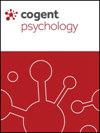Eudaimonia and mindfulness as predictors of alcohol-dependence: a pilot study
IF 1.6
Q2 PSYCHOLOGY, MULTIDISCIPLINARY
引用次数: 0
Abstract
Abstract Both hedonia and eudaimonia contribute to well-being, but existing literature on alcohol-dependence concentrates on hedonic needs alone, leaving a research gap on the role of eudaimonia in alcohol-dependence. Theoretically, mindfulness promotes eudaimonia that presumably benefits individuals with alcohol-dependence, but the empirical literature on the same is scarce. Hence, the current pilot study intended to examine the association of eudaimonia and mindfulness with alcohol-dependence, and assess the feasibility of the main study. Study-I compared mindfulness and eudaimonia of individuals with (N = 154) and without (N = 160) alcohol-dependence. Its results called forth a study-II that explored the role of eudaimonia and mindfulness in predicting alcohol-dependence among the individuals undergoing treatment for alcohol-dependence (N = 110). The data were analyzed using the independent-sample t-test, Pearson correlation, and multiple linear regression. Study-I revealed the significant deficiency of mindfulness and eudaimonia among individuals with alcohol-dependence compared to those without alcohol-dependence. Study-II found that mindfulness and eudaimonia predicted alcohol-dependence and alcohol craving. Study result indicates the potential role of mindfulness and eudaimonia in the effective treatment of alcohol-dependence, through significant correlation among the variables. The study also highlights the feasibility and utility of the main study.快乐和正念作为酒精依赖的预测因素:一项初步研究
本文章由计算机程序翻译,如有差异,请以英文原文为准。
求助全文
约1分钟内获得全文
求助全文
来源期刊

Cogent Psychology
PSYCHOLOGY, MULTIDISCIPLINARY-
CiteScore
2.90
自引率
0.00%
发文量
75
审稿时长
12 weeks
期刊介绍:
One of the largest multidisciplinary open access journals serving the psychology community, Cogent Psychology provides a home for scientifically sound peer-reviewed research. Part of Taylor & Francis / Routledge, the journal provides authors with fast peer review and publication and, through open access publishing, endeavours to help authors share their knowledge with the world. Cogent Psychology particularly encourages interdisciplinary studies and also accepts replication studies and negative results. Cogent Psychology covers a broad range of topics and welcomes submissions in all areas of psychology, ranging from social psychology to neuroscience, and everything in between. Led by Editor-in-Chief Professor Peter Walla of Webster Private University, Austria, and supported by an expert editorial team from institutions across the globe, Cogent Psychology provides our authors with comprehensive and quality peer review. Rather than accepting manuscripts based on their level of importance or impact, editors assess manuscripts objectively, accepting valid, scientific research with sound rigorous methodology. Article-level metrics let the research speak for itself.
 求助内容:
求助内容: 应助结果提醒方式:
应助结果提醒方式:


